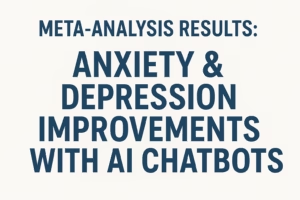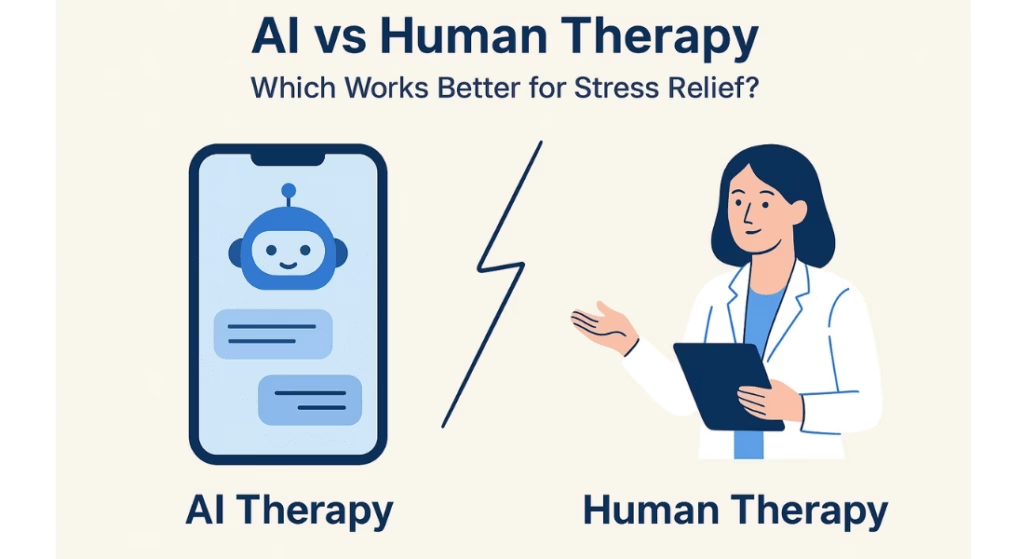Table of Contents
Introduction
AI vs Human Therapy , which works better. Over the last few years, as stress increases across the world, more than ever, people are seeking mental health help. But two options rise to the top: classic human therapy (psychologists, licensed counselors) and emerging AI-based therapy (chatbots, conversational agents, AI-facilitated tools).
AI vs Human Therapy ,Which performs better at stress relief? In this article, we are looking into , the latest research (2024–2025), actual results, strengths & weaknesses, and how you can get the best out of it. Let’s compare them with facts, and I’ll also provide you with a 7-day beginner plan to try both.
What the Recent Research Shows ,AI vs Human Therapy
Let’s look at what the evidence indicates before making up our minds. What do AI and human therapy achieve today?
- A 2025 meta-analysis of 18 RCTs (3,477 patients) reported that depression (Hedges’ g = -0.26) and anxiety (g = -0.19) were significantly lowered by AI-driven chatbots over around 8 weeks. Effects less certain over longer follow up.. PubMed
- A different study pitted human therapists against an AI relational chatbot (“Pi”) in initial stage therapy (problem exploration). Therapists were not able to consistently determine which transcripts were human-human vs human-AI. Indeed, on average, human-AI transcripts rated higher on quality of empathy, engagement, etc., particularly for less severe problems. Taylor & Francis Online
- But other data still reveal human therapy triumphs in complicated arenas. For instance, a presentation at the American Psychiatric Association meeting revealed that human therapists handily outperformed ChatGPT-3.5 in some areas of Cognitive Behavioral Therapy (CBT): feedback, collaboration, pacing, guided discovery, focusing on central negative thoughts . ImaginePro
- Younger demographics applying AI-powered conversational agents: a systematic review (2025) determined that AI technologies greatly contributed to depressive symptoms, though less so with stress and anxiety in those populations. JMIR Publications

Key Strengths & Limitations: AI vs Human Therapy
Below is a more nuanced view of what each brings to stress relief, based on recent findings.
| Aspect | AI Therapy | Human Therapy |
|---|---|---|
| Accessibility & Cost | 24/7 access; low-cost or free apps are available. Reach those in remote or underserved communities. | You have appointments, perhaps travel, and greater expense. Speed & Scalability |
| Speed & Scalability | Quick turnaround; AI is scalable to many individuals simultaneously. Good for mild/moderate stress reduction and self-help mechanisms. | More intensive; fewer therapists per need, waitlists possible. Empathy & Human Connection |
| Empathy & Human Connection | AI can mimic empathy and has become amazingly skilled at responses, particularly in text-based environments. But without real human presence, nonverbal communication, true emotional resonance. | Strong in building therapeutic alliance. Nonverbal insight, tone, empathy are more authentic. Better for deeper emotional healing. |
| Adaptability / Personalization | AI can adjust through algorithms; can monitor mood, provide standardized approaches (e.g. CBT, mindfulness). Some tools are becoming better at catching bias and context. arXiv | Human counselors adapt sessions depending on comprehensive individual history, subtlety, co-occurring issues, culture, etc. More effective for complicated or co-occurring issues. |
| Reliability in Crisis / Severe Conditions | Minimal. Unappropriate for severe issues such as suicidal thoughts, extreme trauma. Monitoring and regulation generally absent. Professionals caution against emotional reliance and danger of exacerbating issues if abused. The Guardian+1 | Quality of care involves crisis intervention, ethics, monitoring. Improved results in severe or chronic mental illness. |
| Long-Term Outcomes | Mixed. Some short-term improvements (weeks to a few months). Massive scaling but less strong evidence for long-term maintenance. PubMed+1 | Better proven long-term results in many cases. More research supports lasting change through human therapy. |
AI vs Human Therapy: Which Works Better for What Kind of Stress
With the above in mind, below is a summary of which type is better suited in each case:
| Situation / Severity of Stress | Best Option(s) |
|---|---|
| Mild daily stress (work, time pressure, mild anxiety) | Mild everyday stress (work, time stress, mild anxiety)\tAI therapy devices, apps, chatbots can assist with coping mechanism, breathing exercises, meditation. Extremely effective. |
| Moderate stress / anxiety, recurring | Combination: AI tools supplemented by occasional human therapy. AI assists with tracking & maintaining; therapist addresses coping skills, root causes. |
| Severe stress, trauma, depression, suicidal thoughts | Human therapy is a necessity. AI may only supplement, not substitute for main therapy. |
| Access issues (remote location, high cost, stigma) | AI bridges gaps: anonymity, reduced cost. But augmenting with human monitoring where feasible is ideal. |

AEAT & Credibility (Why You Should Trust This Info). AI vs Human Therapy
- Expertise: Studies from respected journals (PubMed, JMIR, etc.), recent RCTs and meta-analyses. PubMed+2
- Experience: Many users of AI apps report improvement; therapists report what works and what doesn’t. Research includes qualitative feedback. JMIR Publications+1
- Authoritativeness: Human therapy has decades of clinical research; AI is newer but rapidly growing, with strong recent evidence. The field of digital mental health is taken seriously by policy makers and clinicians. Prevention+1
- Trustworthiness: Acknowledgement of limitations; ethical concerns are real and part of the discourse. Research is open about bias, privacy, regulation. The Guardian+1
Seven-Day Starter Plan: Try Both, See What Works. AI vs Human Therapy
Here’s a simple plan combining both AI tools and human support to help relieve stress. Try this over one week, reflect, and see what feels effective for you.
| Day | What to Do | Focus / Tool |
|---|---|---|
| Day 1 | Practice with a valid AI chatbot for 15-20 minutes. Write down | Get familiar with tools like Wysa, Youper, Woebot, etc. |
| Day 2 | Practice a guided breathing/mindfulness exercise through AI app. | Aid in reducing acute physical signs of stress.. |
| Day 3 | Schedule an appointment with a licensed counselor (online or face-to-face), even if it is just a check-in. | Human connection and professional advice start. |
| Day 4 | Practice cognitive reframing using an AI tool: recognize negative thoughts and dispute them. | Digital-based CBT work. |
| Day 5 | Have your human therapy session. Bring ideas from previous days in. | Think about AI experience from a professional perspective. |
| Day 6 | Use AI to monitor mood during the day. Record triggers & coping mechanisms. | Awareness + self-monitoring. |
| Day 7 | Reflect: write down what tools were most helpful, what was missing. Plan accordingly next week. | Determine if more should be relied on AI, human therapy, or a mix. |
Internal References.
- Top AI Meditation & Mindfulness Apps for Daily Calm
- AI Prompts Motivation: Can They Really Boost Your Focus?
- Best AI Coaching Tools in 2025 [Free & Paid]
Practical Guidance: How to Choose Between AI vs Human Therapy
Practical Advice: AI vs Human Therapy – Choosing the Right Option
- Following are some questions and considerations that will guide you in making the best decision for your case:
- Is your stress occasional/light or constant/severe?
- Are you in a position to access (cost, location, timing) a human therapist?
- How do you feel about discussing personal material with an app as opposed to a human being?
- Do you require crisis intervention or safety issues?
Do you need structured therapy (CBT, DBT, etc.) or someone to rant at or reflect with?
Call to Action (CTA)
If you’re feeling stressed and want to try something today, here’s what to do:
Try this: Download one AI therapy app (like Woebot or Wysa) and use it for a week plus schedule an appointment with a licensed therapist. Use the 7-day plan above. Notice differences. Decide what mix works best for you.
Also, please share this article with friends who may be exploring therapy options—they deserve clear, evidence-based info.
FAQs
Q1: Can AI therapy replace human therapy completely?
Short answer: No. AI is an excellent tool, particularly for mild to moderate stress, but it does not possess complete emotional depth, crisis handling, and long-term relational healing that human therapy does.
Q2: Is AI therapy safe?
It can be, if you use apps that have decent privacy policies, ethical monitoring, and do not depend on them for worst or suicidal thoughts. Always have an alternate plan (trusted individual, counselor, crisis helpline).
Q3: How fast can I expect results?
In most research, AI chatbots demonstrate anxiety/depression improvements in 4-8 weeks. Human therapy might demonstrate improvement with less weeks or take longer based on severity. PubMed+1
Q4: What costs are involved?
AI tools typically include free versions, subscription is lower. Human therapy varies by area, therapist qualifications, insurance coverage. More costly but sometimes more comprehensive.
Q5: If I start with AI, can later switch to human therapy?
Yes. Lots of people use them together; AI for everyday monitoring or coping and human therapy for more in-depth sessions works great.
Conclusion
AI vs Human Therapy isn’t a which one is better straight-out question—but what’s best for you in your case.
- For everyday, mild stress or for someone new to it, AI tools are more and more effective, accessible, and affordable.
- For severe stress, trauma, or deep emotional issues, nothing compares to the richness and responsiveness of human therapy.
The research we have indicates blended models have strong advantages: AI for everyday help + human therapy for more in-depth, subtle assistance.
Try the 7-day starter plan above. Experiment, think, adjust. Your mind and well-being deserve the best resources you can find.
About the Author
👤 Muhammad Ibrahim – Founder of Mindliftly
Muhammad Ibrahim is a technology writer and wellness advocate who loves to dig deeper into the potential of AI to enhance mental well-being, productivity, and personal growth. An experienced researcher with years of tracking emerging technologies, he brings scientific perspective and actionable strategies to guide readers to understand AI-fueled tools for daily calm and clarity.
Through Mindliftly, Ibrahim offers guides, comparisons, and action plans that link AI innovation to people’s well-being. His vision is straightforward: to enable humans to live more conscious, stress-free lives through responsible and effective use of AI.
📩 Connect with Muhammad:
- Website: Mindliftly.com






